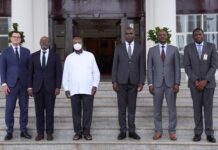BOU Governor Emmanuel Tumusiime-Mutebile said on Monday that many consumers are expected to be hesitant to resume their previous spending patterns, partly due to fears of contracting the virus and uncertainty about earnings. He added that even those whose incomes were not affected may increase their need for precautionary savings.
Ugandans are expected to hold onto their money for longer compared to pre-coronavirus days as many suspend spending due to insecurity of what the future holds, Bank of Uganda has said.
BOU Governor Emmanuel Tumusiime-Mutebile said on Monday that many consumers are expected to be hesitant to resume their previous spending patterns, partly due to fears of contracting the virus and uncertainty about earnings. He added that even those whose incomes were not affected may increase their need for precautionary savings.
He hinted that low spending is bad for the economy as it means businesses will get no demand for their products and therefore no growth. This also means that many will further cut jobs as demand falls. Hundreds of Ugandans lost jobs between March and July 2020 effectively cutting off their spending power.
Mutebile who was reading the monetary policy statement for August 2020 explained that many of those who had money put it in banks on a “wait and see” mode.
This month, BOU data showed that Ugandans are holding more money in fixed deposits to the tune of 8.5 trillion Shillings, the highest amount ever. This meant that many chose not to spend their cash because of the lockdown but also because many aren’t sure when COVID-19 will go away.
Mutebile said that extreme uncertainty characterizes the outlook for the economy. This will slow investment and growth. “Its recovery is heavily dependent upon the intensity, spread, and duration of the COVID-19 pandemic, particularly the heightened risks associated with the second wave of infections,” Mutebile said.
The economy in 2020/21 is projected in the range of 3.0-4.0 per cent, further increasing to 5.0-6.0 per cent in 2021/22b financial year. A widespread and possibly more severe second wave of the virus, requiring a complete lockdown, as well as, the locust invasion will wipe away this optimism.
“Low exports of goods and subdued tourism receipts are projected to continue to weigh on economic growth given weaker global demand,” BOU said.
BOU kept the Central bank rate (CBR) at 7 per cent for the month of August. The CBR indicates the direction of interest rates and with this BOU expects commercial banks to provide more money to Ugandans so that they can spend.
It warns that increasing Non-Performing Loans (NPLs) and high lending interest rates could delay recovery of loan extensions to pre-COVID levels.
Mutebile is, however, optimistic that economic growth could turn out stronger than projected if the spread of the virus is contained, or if a vaccine or effective treatment is available earlier than is currently being assumed.



